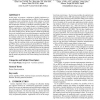Free Online Productivity Tools
i2Speak
i2Symbol
i2OCR
iTex2Img
iWeb2Print
iWeb2Shot
i2Type
iPdf2Split
iPdf2Merge
i2Bopomofo
i2Arabic
i2Style
i2Image
i2PDF
iLatex2Rtf
Sci2ools
180
Voted
FPGA
2006
ACM
2006
ACM
Flexible implementation of genetic algorithms on FPGAs
In this paper, we propose a technique to flexibly implement genetic algorithms for various problems on FPGAs. For the purpose, we propose a basic architecture for GA which consists of several modules for GA operations to compose a GA pipeline, and a parallel architecture consisting of multiple concurrent pipelines. The proposed architectures are simple enough to be implemented on FPGAs, applicable to various problems such as Knapsack Problem and Traveling Salesman Problem (TSP), and easy to estimate the size of the resulting circuit. We also propose a model for predicting the size of resulting circuit from given parameters consisting of the problem size, the number of concurrent pipelines, and the number of candidate solutions for GA. Based on the proposed method, we have implemented a tool to facilitate GA circuit design and development. This tool allows designers to find appropriate parameter values so that the resulting circuit can be accommodated in the target FPGA device, and to ...
Related Content
| Added | 22 Aug 2010 |
| Updated | 17 Jun 2012 |
| Type | Conference |
| Year | 2006 |
| Where | FPGA |
| Authors | Tatsuhiro Tachibana, Yoshihiro Murata, Naoki Shibata, Keiichi Yasumoto, Minoru Ito |
Comments (0)




